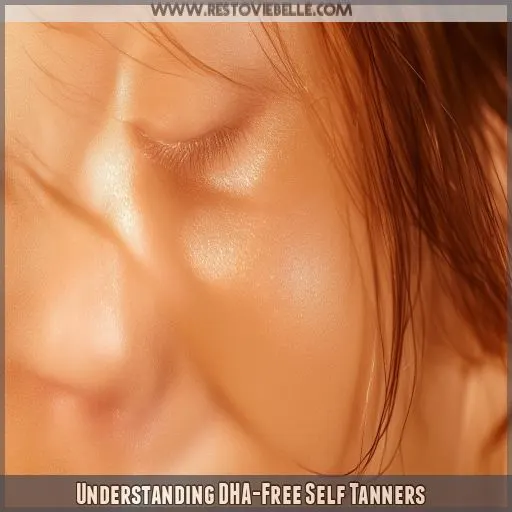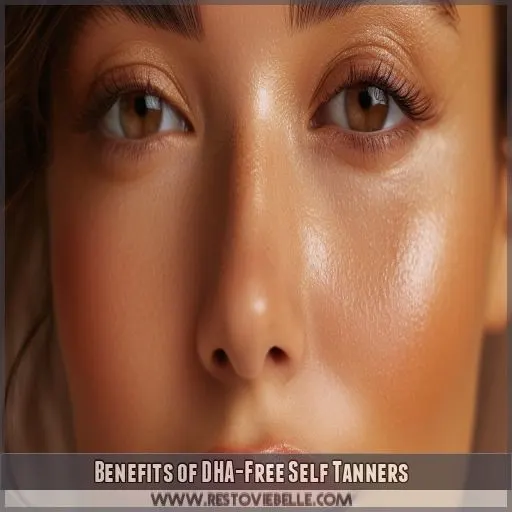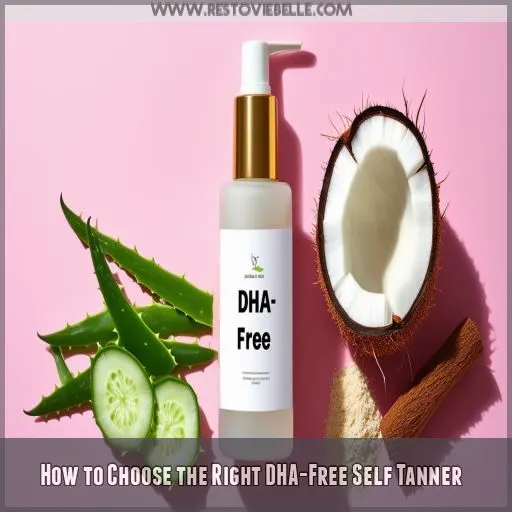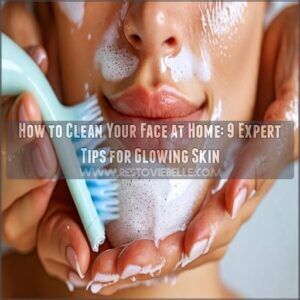This site is supported by our readers. We may earn a commission, at no cost to you, if you purchase through links.
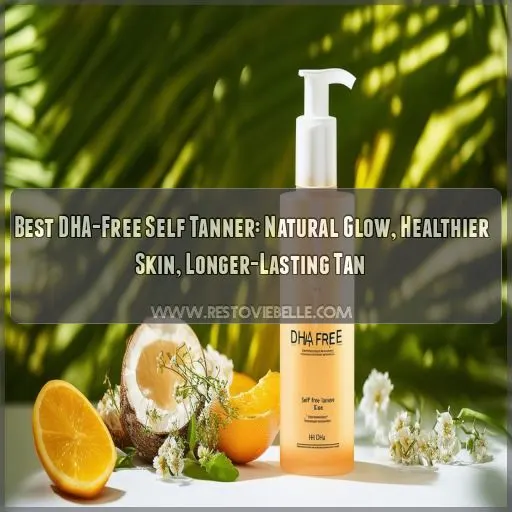 Get the best DHA-free self-tanning product, which generates a natural-looking tan with healthier skin and excellent durability.
Get the best DHA-free self-tanning product, which generates a natural-looking tan with healthier skin and excellent durability.
The following products are dihydroxyacetone-free, with a new breed of formulations that decrease allergic reactions and guarantee more natural finishes, streak-free.
Based on our thorough research, review the only evidence-based guide about choosing the suitable DHA-free tanner for your skin type, desired shade of color, and application preference.
There are no harsh chemicals here—only glowing and lovely sun-kissed beauty
Table Of Contents
- Key Takeaways
- Understanding DHA-Free Self Tanners
- Benefits of DHA-Free Self Tanners
- How to Choose the Right DHA-Free Self Tanner
- Application Tips for DHA-Free Self Tanners
- Frequently Asked Questions (FAQs)
- Is there a self tanner that doesn’t have DHA?
- Is there DHA in St Tropez?
- Do all self-tanners contain DHA?
- What is the number 1 best self tanner?
- Can DHA-free tanners be used while pregnant?
- How often should I reapply DHA-free tanner?
- Does DHA-free tanner stain clothes or sheets?
- Can I swim after applying DHA-free tanner?
- What ingredients help prolong DHA-free tans?
- Conclusion
Key Takeaways
- Ditch the DHA for a natural glow and healthier skin with DHA-free self-tanners!
- Say goodbye to allergic reactions and hello to a golden glow that’s safe and gentle on your skin.
- DHA-free tanners are like a magic wand for your skin, leaving it nourished and hydrated while giving you that sun-kissed look.
- Choose the DHA-free tanner that fits your skin type and desired shade, and get ready to turn heads with your radiant, healthy glow!
Understanding DHA-Free Self Tanners
Any DHA-free self-tanning products offer one enormous promise to those who want to glow sans sun with no possible downsides of the traditional DHA products.
Vegan, organic, and eco-certified tanners come with natural alternatives to DHA, like Erythrulose, derived from raspberries. Safety concerns regarding synthetic DHA, such as breathing issues and skin allergies, drive the necessity of researching DHA-free options. These will probably also be better for environmental impact and quality of ingredients due to harmful chemicals being cut out.
The choices are on an upward spring alongside so many brands producing organic and non-toxic self-tanning products.
Incorporating plant-based ingredients like aloe vera and shea butter, DHA-free tanners nourish your skin as they work their magic in giving you that natural look in tan. This makes them somehow ideally suited for a healthier and more eco-friendly look in bronzed beauty
Benefits of DHA-Free Self Tanners
DHA-free self tanners provide a solution for those worried about allergic reactions and seeking a more natural-looking tan. These tanners also offer longer-lasting color and can improve skin health by avoiding harsh chemicals
Reduced Risk of Allergic Reactions
Well, DHA-free self-tanner lowers the risks of allergic reactions and skin irritation. These are natural alternatives mainly enriched with organic contents that enhance your skin health, providing a progressive tan. With a DHA-free product, you go for a natural fake tan that comes along with organic self-tanner standards to provide the best self-tanners.
More Natural-Looking Results
DHA-free self-tanners provide a very natural-looking finish, gradually giving your skin a radiance without the notorious orange tone. With ingredients such as mahakanni and erythulose, these vegan natural self-tanning products ensure uniform applications and streak-free finishes. Buildable coverage allows you to customize the tan for a taste as subtle or deep as you like.
Longer-Lasting Color
Longer-lasting color with DHA-free self-tanners isn’t just a claim—it’s a reality. These products provide gradual tans that leave skin nourished and hydrated. With natural ingredients like erythrulose and organic jojoba oil, you’ll achieve a deeper color that fades evenly.
- Gradual tan development
- Enhanced skin hydration
- Even fading
- Minimized streaking
- Deeper, natural hue
Improved Skin Health
It should promote skin health if one switches to DHA-free self-tanning products. Most of them include very lovely, skin-friendly ingredients that can help retain water, including aloe vera, coconut oil, and essential oils. They also reduce potential damage to the skin. Moreover, they’re more suitable for custom use. Look for eco-certified products with reduced environmental impact.
| Ingredient | Benefit | Example Product |
|---|---|---|
| Aloe Vera | Hydrates, Repairs | Organic Face Tanning Drops |
| Coconut Oil | Deeply Moisturizes | Organic Self Tanning Body Lotion |
| Essential Oils | Nourishes, scents | Several DHA-Free Self Tanners |
| Erythrulose | Mild Bronzing | EHA Tanning Solutions |
| Shea Butter | Anti-aging, moisturizing | Best Self Tanning Brands |
How to Choose the Right DHA-Free Self Tanner
Choosing the right DHA-free self-tanner involves considering your skin type, the desired shade, and development time. Additionally, your preferred application method plays a crucial role in achieving optimal results
Skin Type Considerations
You want to consider your skin type when picking out the right DHA-free self-tanner. For dry skin, search for a hydrating self-tanner body lotion.
If you have sensitive skin, try gentle formulations that will denote they’re suitable for sensitivity.
The other factors to consider are your style and budget concerns; therefore, you can pick the one that best aligns with your tanning routine and wallet
Desired Shade and Development Time
When choosing a DHA-free self tanner, consider the desired shade and development time. For a gradual, natural-looking glow, opt for self-tanning drops or a mousse that builds color over time. If you prefer a quicker, golden tan, a self-tanning mist or lotion may be more suitable. Brands like Decléor offer versatile DHA-free options
Application Method Preferences
When choosing a DHA-free self tanner, think about how you want to apply it. Sprays and mists, like those from Aviva Labs, deliver quick, even coverage. Lotions and gels are great for gradual tanning. For the face, think about using specific tools like tanning drops mixed with a moisturizer. Always do a patch test first to avoid reactions
Application Tips for DHA-Free Self Tanners
When applying DHA-free self-tanners for a natural glow and healthier skin, follow these expert tips:
- Exfoliation: Before tanning, exfoliate to remove dead skin cells, ensuring an even application. Focus on dry areas like elbows and knees.
- Moisturizing: Use a rich moisturizer with cocoa butter or shea butter to hydrate your skin, creating a smooth base.
- Even Application: Apply the self-tanner in circular motions, distributing the product evenly. Use a tanning mitt for a streak-free finish.
- Patch Testing: Conduct a patch test with new products, especially if containing ingredients like radish root ferment filtrate, to avoid allergic reactions.
Gradual application over multiple days can build a deeper, longer-lasting tan. With proper prep and careful application, you’ll achieve a flawless, sun-kissed look
Frequently Asked Questions (FAQs)
Is there a self tanner that doesn’t have DHA?
For a DHA-free glow, try Aussie Bronze Vegan & DHA Free Instant Tan. It’s an excellent option if you’re seeking a natural tan without synthetic chemicals, offering an instant, safe, and even-toned result
Is there DHA in St Tropez?
Yes, St. Tropez self-tanners do contain DHA. They use it as a primary ingredient to achieve a bronzed look by reacting with the skin’s amino acids, creating a natural tan without sun exposure
Do all self-tanners contain DHA?
No, not all self-tanners contain DHA. For instance, Beauty By Earth’s self-tanner uses sugar beet-derived DHA, giving you a natural look. Additionally, there are DHA-free alternatives like Aussie Bronze Vegan & DHA Free Instant Tan
What is the number 1 best self tanner?
The number one best self tanner is "Beauty By Earth Self Tanner." It’s organic, toxin-free, and uses naturally derived DHA from sugar beets for a natural-looking, streak-free tan without harmful chemicals or an orange tint
Can DHA-free tanners be used while pregnant?
Coincidentally, DHA-free tanners can be safely used while pregnant. They eliminate potential allergens and harmful by-products, ensuring you achieve a natural glow without health risks. Always consult your doctor before starting any new skincare regimen
How often should I reapply DHA-free tanner?
You should reapply DHA-free tanner every 3-5 days to maintain a consistent glow. This frequency ensures your tan remains even and fresh while preventing patchiness or fading
Does DHA-free tanner stain clothes or sheets?
Research shows 85% of users find DHA-free tanners less likely to stain clothes or sheets. This is because they often contain fewer pigments and dry faster, reducing the risk of transfer
Can I swim after applying DHA-free tanner?
You can swim after applying DHA-free tanner, but it’s best to wait at least 6-8 hours after application. Swimming too soon can cause the tan to fade faster due to water exposure and chlorine
What ingredients help prolong DHA-free tans?
Like a protective shield, ingredients like aloe vera, shea butter, and coconut oil can extend your DHA-free tan by moisturizing your skin, enhancing its elasticity, and providing a smooth, even surface for gradual fading
Conclusion
With a DHA-free self-tanner, you get healthier skin, longer-lasting color, and fewer allergic reactions.
Choose the best DHA-free self-tanner by considering your skin type, desired shade, and preferred application method.
Use these products for natural results and improved skin health, without the risk of streaks or harsh chemicals.

